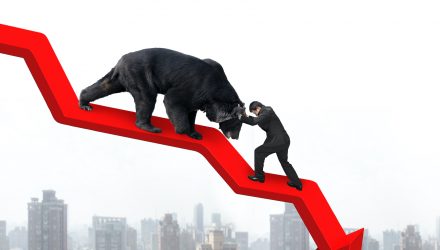Stocks are giving back some of the significant gains made in the first 3-day run for the Dow and the S&P 500 since the inauguration of the fastest bear market in history that commenced in February, amid news that the United States is now the country with the most confirmed cases of coronavirus.
The Dow Jones Industrial Average slipped 783 points or 3.5%. The S&P 500 tumbled 3.2% along with the Nasdaq Composite.
Stock index ETFs are also struggling on Friday, with the SPDR S&P 500 ETF Trust (SPY) down 2.37%, the SPDR Dow Jones Industrial Average ETF (DIA) drooping 2.81%, and the Invesco QQQ Trust (QQQ) falling 2.73%.
While many investors were naturally elated by the back-to-back rally higher, which occurred amid the worst jobless claims in history, analysts are naturally still cautious as to whether the downside is completed.

“We believe medium-term risks are skewed to the downside after this rally,” Maneesh Deshpande, Barclays’ chief U.S. equity strategist, said in a note on Friday. “Two other uncertainties facing investors (the length of the economic quarantine required to contain the virus and the ultimate economic damage) remain unresolved.”
Deshpande explained how it is quite normal for violent bear market rallies, which can lure unaware investors to buy stock, only to watch the market turn around and drop once again, moving deeper into a recession.

“Bear market ‘head-fake’ rallies are not uncommon,” Deshpande added. The bear runs that began in 2000 and 2007 both had head fakes of more than 20% before ending, Barclays data shows. The biggest bear market head fake came during the bear market that started in 1937 when stocks rallied more than 60% before falling again.
Although markets have screamed back roughly 20% off the lows, the major averages were still over 20% below the record highs set last month. Investors have continued to rid themselves of riskier assets such as stocks given the uncertainty over the economic fallout from the coronavirus.
“This is going to be an economic fallout. We’re seeing in two weeks what we would normally see maybe in a year and a half or two years,” said Gregory Faranello, head of U.S. rates trading at AmeriVet Securities.
Nevertheless, finishing the week positive for markets is likely to be a consolation for many investors.
For more market trends, visit ETF Trends.
